PDN Committee Members
Anna Kolodziejczak
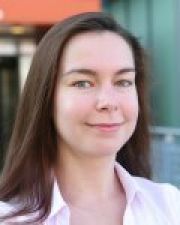
Anna Kolodziejczak
Speaker
Anna Kolodziejczak, born in Poland, started her academic education at Poznan University of Medical Sciences where she studied Biotechnology. Before getting her M.Sc. degree, Anna was awarded the Fulbright foundation scholarship and spent a year at the University of Virginia investigating the role of checkpoint kinases in prostate cancer. This experience sparked her interest in DNA damage repair mechanisms, which turned out to be her main focus during her PhD at DKFZ. After defending her dissertation she joined the ADDRess consortium as a postdoctoral researcher. Her current project is focused on model development for Disorders with Abnormal DNA Damage Response (DADDRs) and drug screening in in-vitro and in-vivo settings. Outside of the lab she practices capoeira (10 years) and enjoys making training for beginners and intermediates as a member of the Brasilianisch-Deutsches Zentrum Heidelberg association.
Fiona Brown-Burke
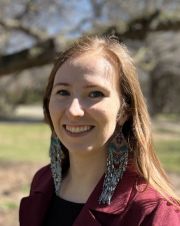
Fiona Brown-Burke
Speaker
Fiona Brown-Burke was born and studied in the USA before moving to Germany in 2023. She recieved her PhD in Biomedical Sciences from the Ohio State University in 2023 with a project focused on novel therapeutics and mouse models for Mantle Cell Lymphoma. Currently she works in the division of Cancer Epigenomics, exploring how epigenetic hetereogeneity influences Acute Myeloid Leukemia. While interested in all things hematology, Fiona plans be involved in scientific policy to advocate for funding and support for researchers. Outside of lab, Fiona loves complex board games, exploring new resturants, and learning about all things Germany. If you are interested in working in the US, please reach out and Fiona would love to share her network and expertise.
Simon Linder
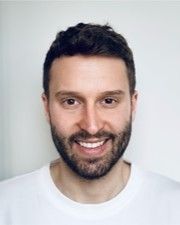
Simon Linder
Simon studied Biomolecular Engineering at the Technical University of Darmstadt and received his PhD in Biomedical Engineering from Eindhoven University of Technology in 2023. He conducted his PhD research at the Netherlands Cancer Institute in Amsterdam, where he focused on improving our current understanding of hormonal signaling in prostate cancer to gain more insights into the cellular adaptation mechanisms that lead to acquired hormone therapy resistance by using integrative multi-omics approaches. In 2023, he was awarded a DKFZ postdoctoral fellowship and joined the division of Translational Medical Oncology. There, he uses integrative epigenomic profiling to unravel novel targetable vulnerabilities in rare cancers. In his spare time, Simon enjoys sports, traveling, spending time with friends and good coffee.
Alex Lipka
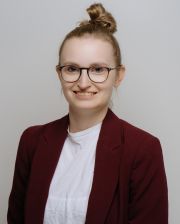
Alex Lipka
Alex was born and raised in Munich, but left Germany for Austria shortly after finishing high school. She graduated in Molecular Biosciences (Biophysics track) from the Paris-Lodron-University Salzburg and Johannes Kepler University Linz (cooperation BSc) and then moved to Vienna for a MSc in Neuroscience (Neuroimaging focus) at the University of Vienna, gaining first experience in Magnetic Resonance Spectroscopic Imaging (MRSI). She obtained a PhD in Medical Physics from the Medical University of Vienna, where she focused on ultrahigh field (UHF) MRSI in Multiple Sclerosis patients looking for neurometabolic imaging biomarkers for disease progression and treatment monitoring. During the lengthy process of PhD thesis revision, she spent half a year at Purdue University in the US, working on preclinical UHF T1 mapping using non-cartesian rosette trajectories. After returning to Europe, she started her PostDoc position at DKFZ in April 2024, further broadening her skills in method development for MR. When she's not coding or measuring, she loves to go bouldering and is a non-profit organization volunteering junkie, avid traveller and foodie, who never runs out of weird jokes.
Aga Seretny
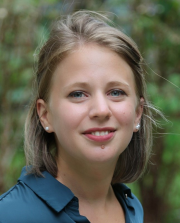
Aga Seretny
Born and raised in Poland, Aga began her academic journey at Jagiellonian University in Cracow, where she first developed a strong interest in cancer research. This passion led her to the University of Chicago as a Fulbright scholar, further expanding her expertise. Her drive to understand cancer on a deeper level eventually brought her to DKFZ, where she pursued a PhD focused on liver cancer. During her time at DKFZ, Aga has been an active advocate for creating an inclusive, safe, and healthy environment for the research community. Serving on the PhD council and as a member of Helmholtz Juniors for over 2.5 years, she focused on the N² survey, gaining insight into the mental health challenges facing academia. Aga has also been involved in addressing barriers to inclusion in Germany and actively worked towards finding practical solutions to improve working conditions for early-career researchers. Outside the lab, Aga enjoys spending time with good company and indulging in great food. A lover of live entertainment, she is always on the lookout for her next favorite show or performance.
Sonja Herter
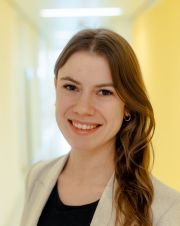
Sonja Herter
Born and raised in Germany, Sonja pursued her studies in Pharmacy at the University of Tübingen, where she first gained experience in a public pharmacy while completing her master's in Pharmaceutical Sciences and Technologies. She later spent six months at Yale, where she focused her master's thesis on the role of long non-coding RNAs in cancer. Her dedication to cancer research led her to the DKFZ, where she completed her PhD using drug screening to identify novel vulnerabilities in neuroblastoma. In her postdoctoral role, Sonja is part of the clinical cooperation unit for pediatric oncology, contributing pre-clinical data for collaborations with pharmaceutical companies. Outside the lab, Sonja is always seeking new challenges, especially those that involve sports and active pursuits.
Thomas Kerzel
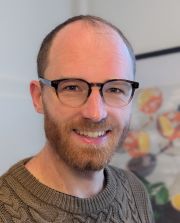
Thomas Kerzel
Thomas started his scientific career by studying biochemistry at the Goethe University in Frankfurt. During this time, he started to show interest in the field of in vivo gene therapy for cancer immunotherapy application. After significant internships in London and Vancouver, he obtained his PhD in Molecular Medicine at the San Raffaele Telethon Institute for Gene Therapy in Milan. His PhD research focused on the development of a lentiviral vector-based gene therapy platform for engineering of hepatic macrophages in vivo for the treatment of liver metastasis. In 2024, supported by the DKFZ postdoctoral fellowship, he started his postdoc in a shared position between at the division of Neuroimmunology and Brain Tumor Immunology at the DKFZ in Heidelberg and the mRNA Cancer Immunotherapies division at HI-TRON in Mainz. His research focusses on the development of innovative LNP-based tools for in vivo engineering of T cells.
Sophie Bromberger
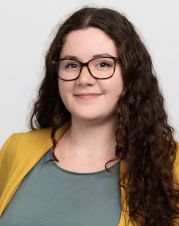
Sophie Bromberger
Born in Austria, Sophie Bromberger earned her Bachelor's degree in Biomedical Science (UAS Campus Vienna) and her Master's degree in Tissue Engineering and Regenerative Medicine (UAS Technikum Vienna). Her Master's thesis at Harvard Medical School in Boston, funded by a Marshall Plan Scholarship, focused on purinergic signaling in immune cell function. Sophie pursued her passion for vascular biology during her PhD at the Medical University of Vienna, where she studied the effects of cancer therapies on the blood vasculature. During this time, an EMBO Scientific Exchange Grant enabled a short-term fellowship at the University of Southern Denmark in Odense, where she performed (phospho)proteomics analyses of vascular cells. In November 2024, she started her postdoctoral research at the DKFZ, where she is investigating the influence of sex hormones on vascular function. Outside the lab, Sophie enjoys singing Jazz and Rock and is always on the lookout for the coziest coffee spots.
Contact
If you want to contact our PDN commitee, please send your message to the following e-mail address:
